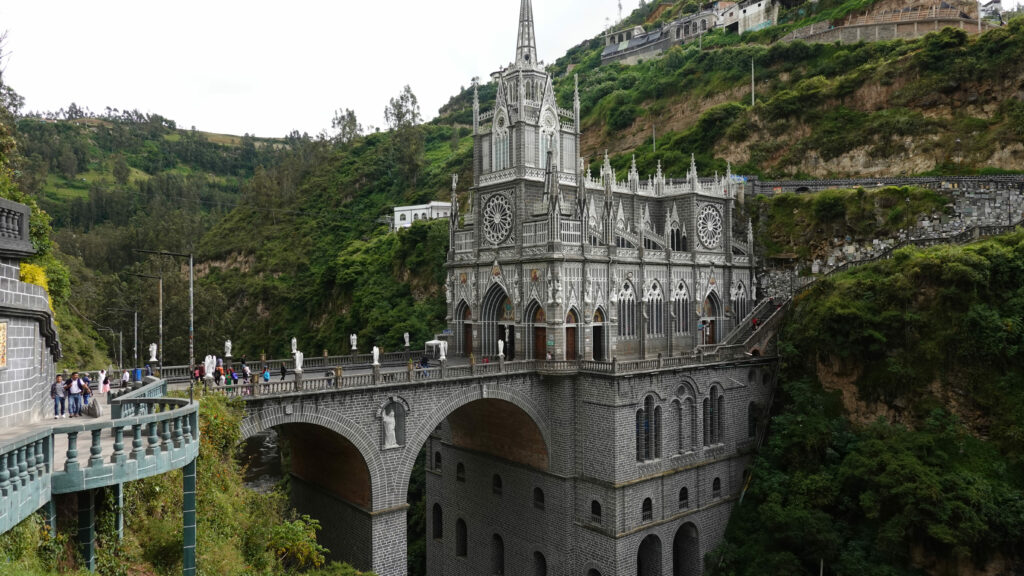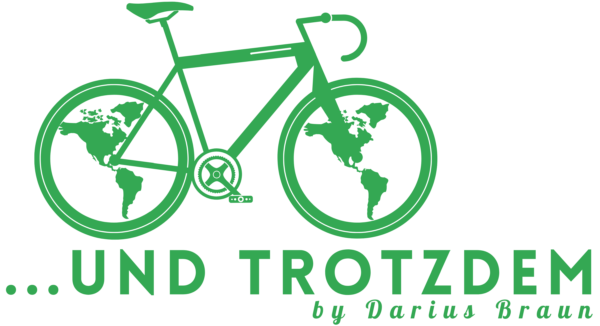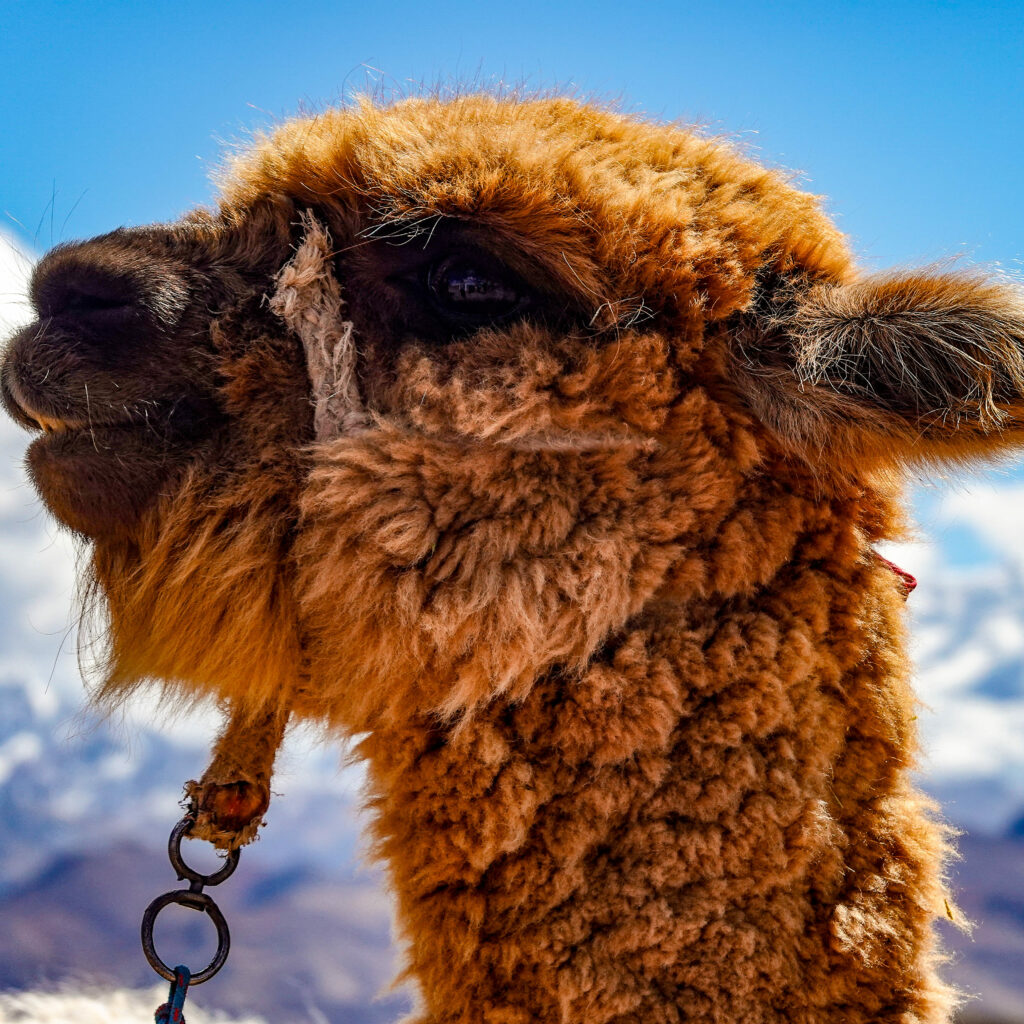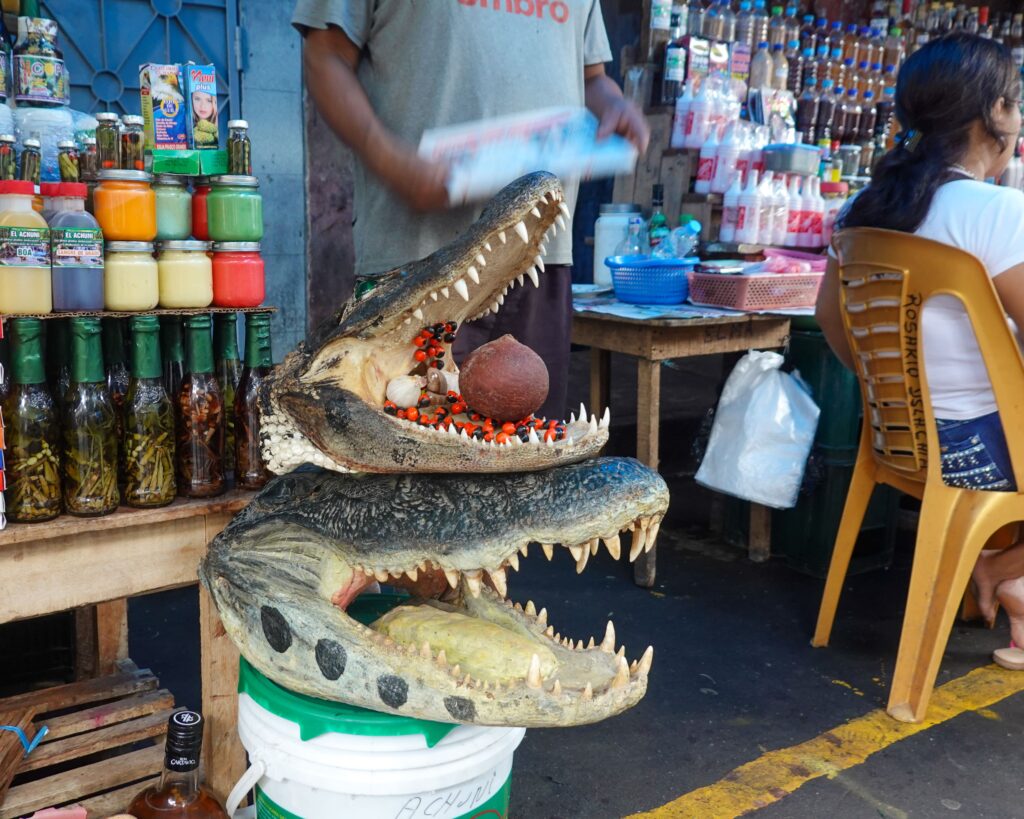After my unexpected television success and the moving encounters in “Bogota”, I made my way to “Cali”, passing Colombia’s famous coffee region. Leaving the city, I was approached by several people who had seen my interview on TV and wanted to take a picture with me. This game continued sometimes more sometimes less on my whole trip to the Ecuadorian border. In passing a moped driver asked me whether I was the German with the bicycle? Partly there were great and nice encounters with other bicycle enthusiastic people who found my tour interesting or my story touching. From time to time, however, people came up to me in the most inappropriate situations and rather rudely interrupted conversations with other people just to quickly take a photo with me.
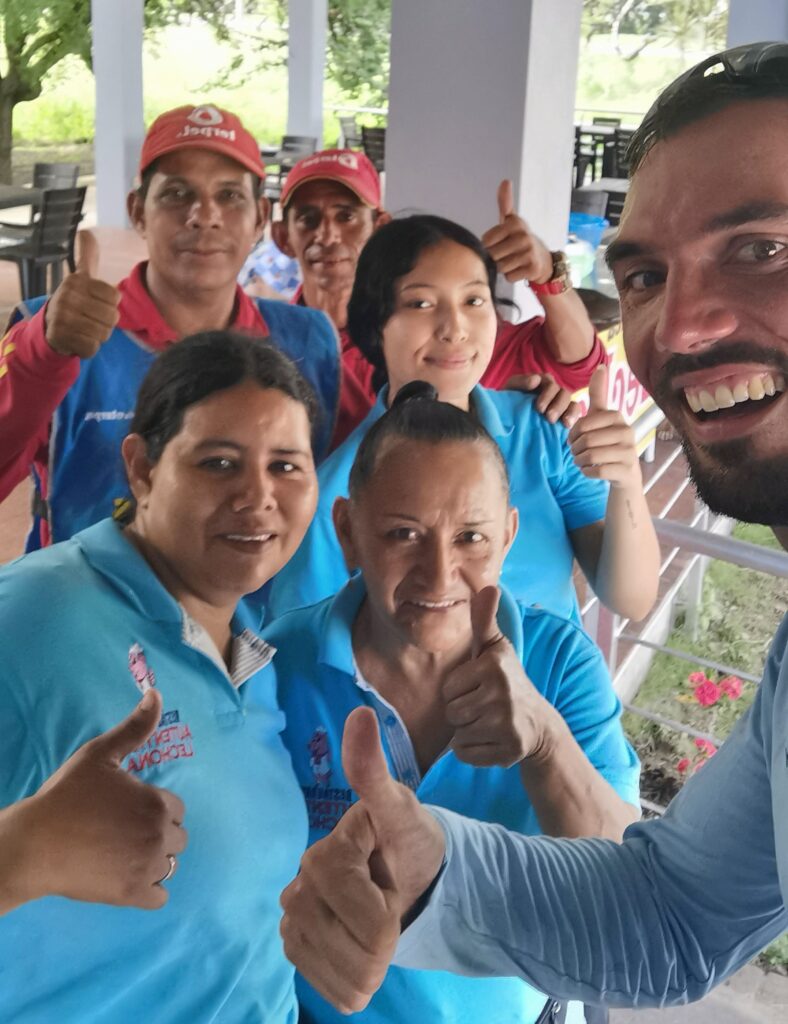
That is probably the downside of being known. Except for a few encounters, this was fortunately limited. However, it was really nice that I was invited again and again by people to eat or stay overnight. For example, on the day I left “Bogota,” I got a message from Alejandra saying that she had seen my TV interview and found it so touching that she invited me to relax at the hotel where she worked. She manages the spa area in this hotel and wanted to do something good for me. Since I suffer a lot of hardships as a cyclist and would help so many people with my message, she thought the least she could do was to invite me to the spa hotel for two days. Since the hotel was located in the coffee region of Colombia, almost on my way to “Cali”, this opportunity offered itself perfectly and I agreed to her overjoyed. This news made me so happy that I could not believe it at first. That a person just like that, without knowing me, gave me a wellness hotel stay, was already something very special.
Anyone who has ever crossed Colombia knows that it is constantly uphill and downhill. From “Bogotá” I first drove over 2000 meters of altitude downhill. The weather changed from wet and cold to tropical heat. It went through a lowland and after a few hundred kilometers uphill again to overcome the mountain range of the central Cordilleras.
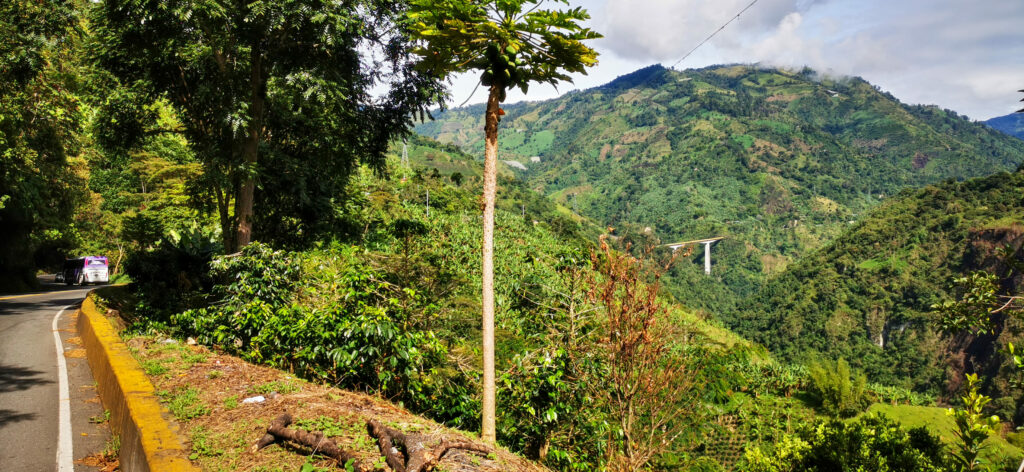
For a better idea, a short geographical explanation:
Colombia can be divided into 7 different geographical landscapes, which, in simplified terms, run from north to south. It starts with the Pacific coast in the west, the adjoining western Cordilleras, then a large basin landscape, in which for example “Cali” is located. Then follow the central Cordilleras, another basin landscape, and the eastern Cordilleras, on whose offshore plateau “Bogotá” is located. The largest part of the country’s surface is occupied by the eastern lowlands, which extend from the Amazon basin to the Caribbean coast. Figuratively, it is easier to imagine it as a hand with three fingers spread out. If you spread the index and ring fingers from the middle finger, the three fingers correspond to the mountain ranges that unite to form the Andes to the south. The spaces in between are the respective valleys, or basin landscapes.
On the way to “Cali” I drove several hundred kilometers through the lowlands towards the central Cordilleras. Before crossing the mountain range is the city of “Ibagué”. Shortly before the city I met Fabian, who was on his morning road bike ride. Although I was clearly slower, he accompanied me to the city center and invited me to his home.
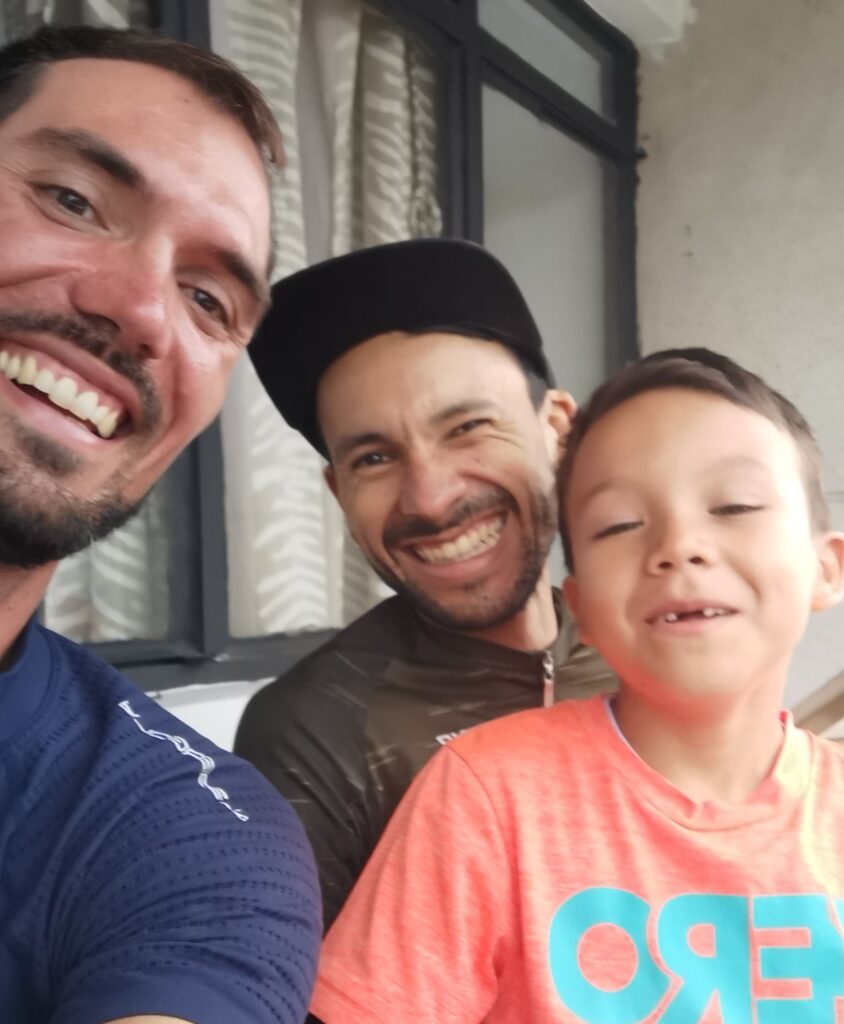
The pass road “Alto de la Linea”, known in this region for its length and steepness, leads from “Ibagué”, almost 90 km to “Armerina”, on the other side of the mountain range. Just under 60 km it climbs almost 3000 meters of altitude up to about 3300 meters – quite a challenge.
Small fun fact: Only 50 km further north is the pass road “Alto de las Letras”, which is the longest pass road in the world with 80 km of continuous ascent. With over 3300 meters of altitude difference, it is a popular challenge for cyclists from all over the world, which many want to climb once in a lifetime.
Since I only learned about it later, I had to settle for the slightly smaller pass.
Back to Fabian in “Ibagué”. Since it was raining like the end of the world that afternoon, I spent the afternoon with Fabian’s family and spent the night there.
The next morning at 6 a.m., I set out to master the 60 km mountain climb. Fabian had told me that his personal record on a road bike was 3.5 hours. His road bike is the purest flyweight compared to my fully packed fat ship. I’m fit but pedaling uphill with over 50 kg feels like someone holding onto my bike with roller skates. The steeper it gets, the more the weight pulls you back.
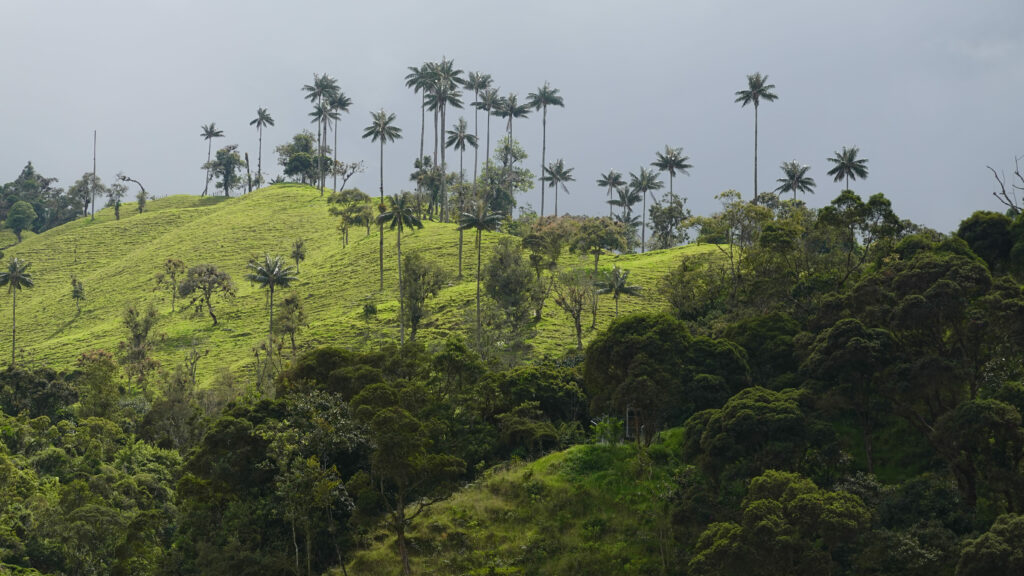
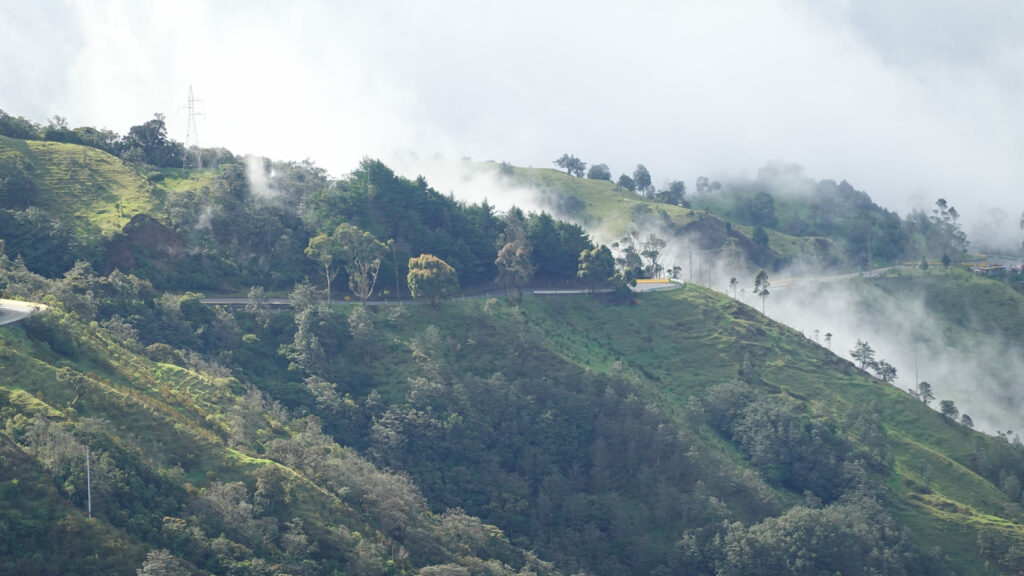
However, the beautiful landscape compensated me for all the agony. On the way, I caught sight of the famous tallest palm trees in the world, which only grow in these climatic conditions at an altitude of over 2000 meters. With a height of up to 60 meters, they are quite impressive. After almost 6 hours of cycling and a few breathers, I stood sweaty but happy at the top of the pass at 3300 meters. In the valley, it was still around 30 ° C and arrived at the top of the pass, the temperature had dropped to 9 ° C. Wrapped up warm for the descent, the rewarding descent then followed. The road was in excellent condition and I was able to descend easily without fear of potholes. I shot past a few trucks that had previously overtaken me, full of satisfaction, and arrived in the valley half an hour later. In the evening I was really proud to have set my new private record and fell asleep like a baby in the knowledge that I would soon be pampered in a wellness hotel.
The next day I met Alejandra in “Pereia”, 60 km away. Here she lives together with her husband Johanny and their 11-year-old son Samuel. Alejandra welcomed me warmly, as if we had known each other forever. We went to her family’s home, had lunch and got to know each other better.
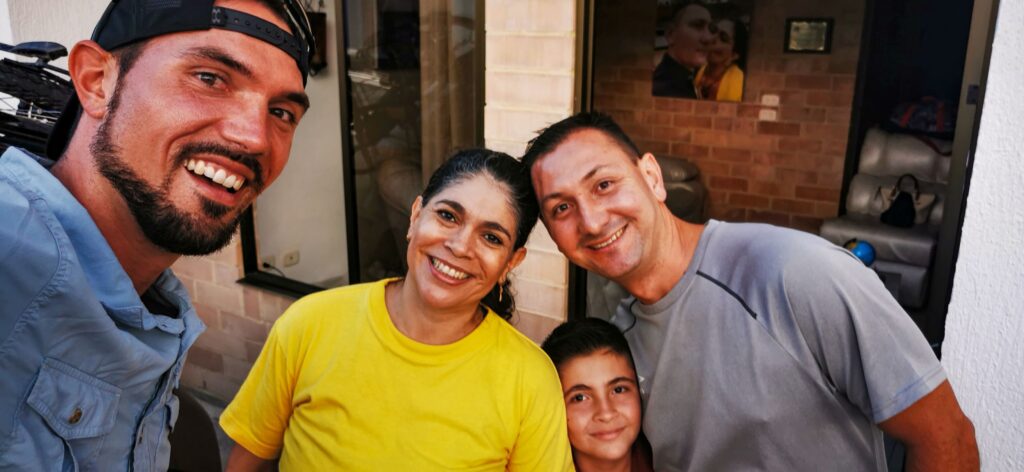
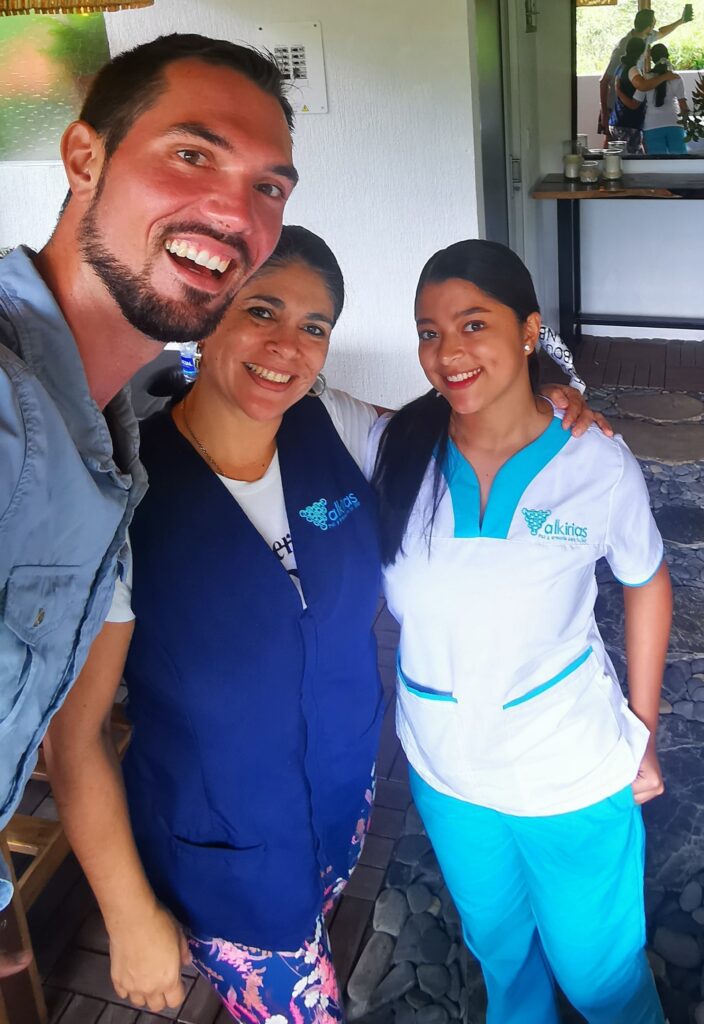
In the afternoon we drove together to the hotel and I immediately got my first treatment – a two-hour therapy massage. I don’t remember much, because after a few minutes I fell as if in a trance and only came to again when everything was over. Despite the massage, I slept very fitfully that night. Something had activated the treatment in me but had not yet let me relax completely. The next day I enjoyed the super delicious breakfast and the beautiful garden of the hotel. I could really relax and recharge my batteries. In the afternoon followed a wellness facial with all kinds of creams and finally a 2 – hour four-hand relaxation massage, which now really loosened all blockages and tensions. That night I slept soundly and woke up the next morning only 12 hours later. After two days the stay in the hotel was unfortunately already over. Honestly, I would have been able to endure it for a few more days. In the evening of the second day, Alejandra invited some friends of the family to introduce me to them. One of them was a psychologist and was totally taken with me and my story. He said that he would like to use me as an example to inspire and motivate his patients. I was so happy about that, because it means that my message will always be carried on by others.
The evening and the conversations were really great and there was a wonderful positive energy in the house.
Before I left the next morning, Johanny presented me with one of his old police badges. He played a police march over the stereo and solemnly handed me his badge, which he had received after 10 years of service and exemplary behavior. That was pretty cool and a great honor. Even though I had only known Alejandra and Johanny for a few days, we had a very friendly connection, as if we had been very good friends for a long time.
The following 250 km to “Cali” were quite relaxed. Since “Cali”, as described earlier, is located in a lowland plain and it was top flat, I felt almost lazy when at the end of the day there were only a few hundred meters of altitude on my GPS device.
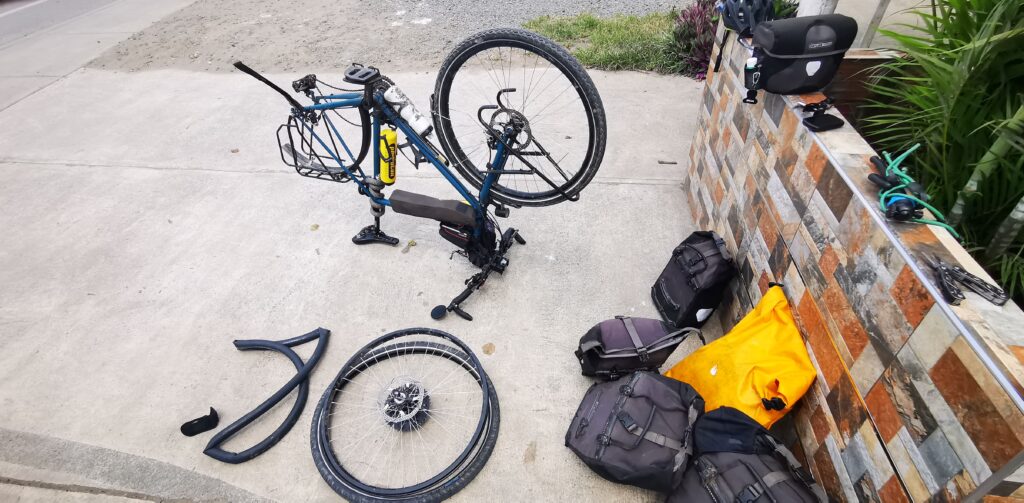
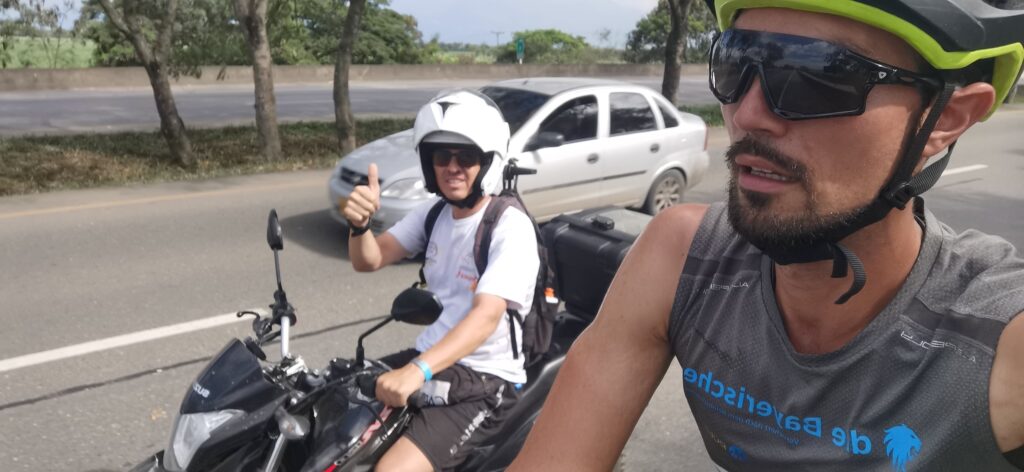
Similar to Alejandra, after my TV interview Andrés, a professional cyclist, wrote to me and invited me to join him at a café. He lives in “Palmira”, a small town about 20 km from “Cali”. Shortly before I reached “Palmira”, I wrote him that he could meet me with his bike. I sent him a city location message via Google Maps, but shortly after that my location did not move any further. After more than 4000 km I had a flat tire. Since I had switched to bicycle tubes with integrated puncture protection in Mexico, I had no more problems. Since my rear tire was now quite worn, glass splinters came more easily through the rubber and pierced the tube. Somehow it was exciting and special to have to change a tube again after such a long time. Andrés, who had already suspected something worse, came with his motorcycle to look after me. Since I had already changed the tube and could continue, he accompanied me and gave me escort. Although the highway has a shoulder there, it was very pleasant. Arrived in “Palmira”, I asked Andrés to visit a bicycle dealer with me, because to my small breakdown also a spoke was broken and the rear tire had to be centered. A good cycling friend and former teammate of Andrés runs a bike store. Due to his experience in professional sports, he immediately recognized some problems and fixed them immediately. The rim was also professionally repaired. I’ve had a few bike services done in the meantime, but none paid as much attention to detail as this one. In the meantime, Andrés’ 15-year-old son Samuel had also arrived, who spoke very good English and helped me translate. All the staff, Andrés and his son were enthusiastically examining my bike with all the luggage. Expensive carbon road bikes in the upper 4-digit dollar range were commonplace for them, but such a bike was something completely new for them.
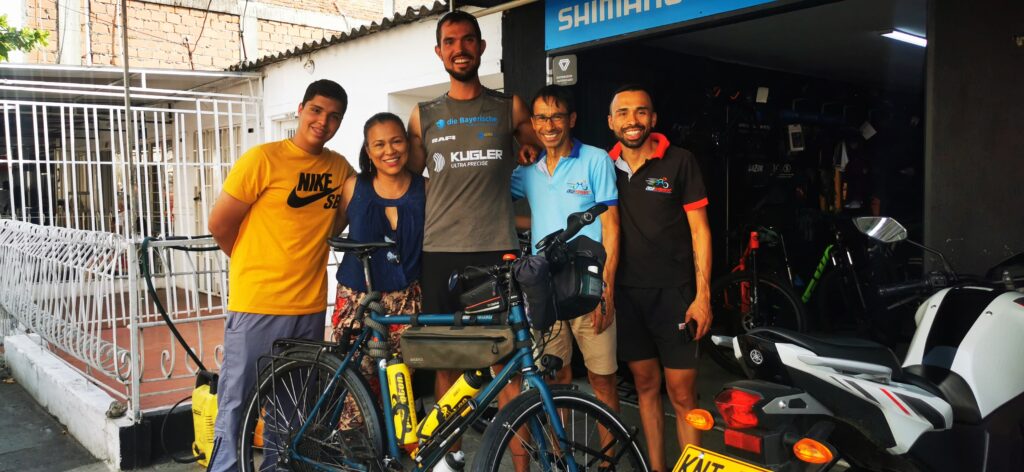
In the evening I also met André’s wife Diana, who works as a physiotherapist and immediately showed me a few preventive exercises to strengthen my back. Originally only on a café, I was finally invited to stay overnight and the next day the family insisted that I should also stay another night. Andrés amazed me a lot. Despite his 45 years, he still rides a bike for the Colombian national team. Not in all areas as he did a few years ago, but he still feels fit, extremely motivated and can still take on much younger rivals, he said with conviction. What is important, he said, is a high level of training discipline and enthusiasm for the sport. His flame is still burning strongly, and if that diminishes, it’s time to cut back on professional sports. At the same time, he is working as a junior coach and, after his active time, would like to set up a foundation that opens up new opportunities and perspectives in life for destitute children and young people with the help of cycling. As a former competitive rower, I can empathize very well with Andrés and share the same views. Willpower and motivation can make anything possible in life. As long as you really want it and work hard for it, you can accomplish almost anything.
The next day I accompanied Andrés to one of his junior training sessions. Together I rode with him on his trainer’s motorcycle, equipped with all kinds of warning lights for the traffic behind and with a loudspeaker system so that he could give his commands and comments. I felt somewhat nostalgic for my rowing days. As a coach, Andrés appeared consistent and determined but also compassionate, respectful and very motivating. I would have liked that in my past as well. I think the children appreciate him very much and give their best, which can also be seen in their results. Just two days after my visit, the kids had a race. Two of them were on the winner’s podium, which Andrés proudly told me. After two days in which I felt warmly welcomed from the first moment, I said goodbye to Andrés, Diana and Samuel. After such a short time, the family had taken me and I them, into my heart. Just like Alejandra and Johanny, I hope to see them again sometime in the future.
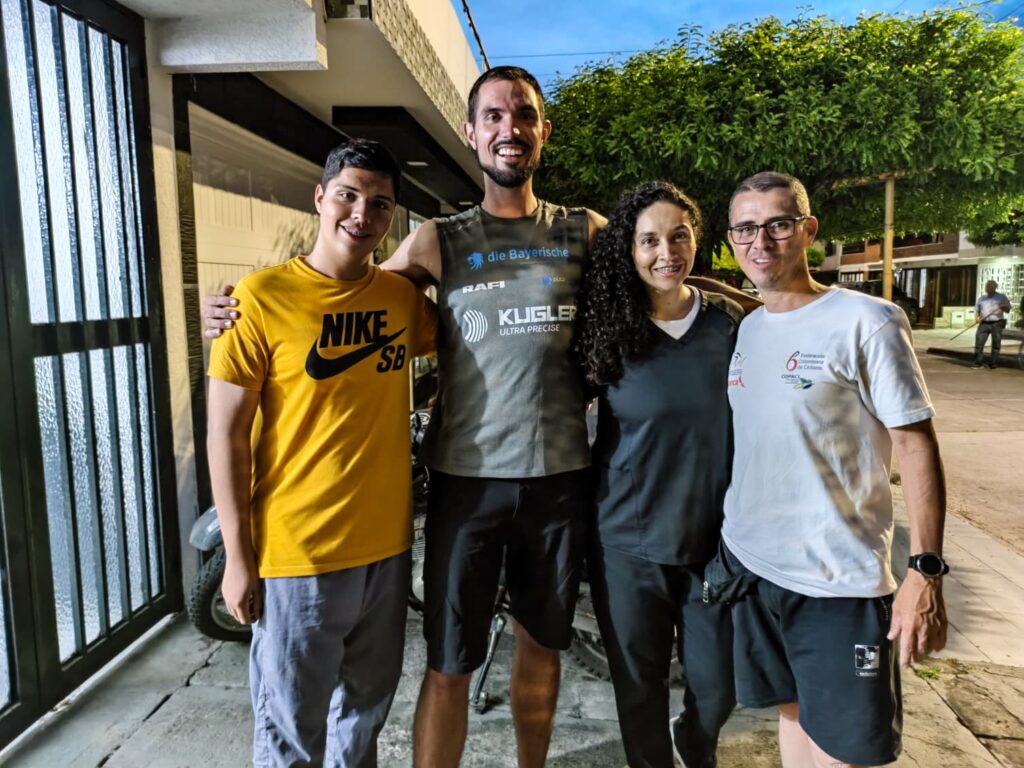
Again and again I meet other travelers on my tour who ask me whether the constant driving on is not too stupid in the long run? In addition, I could not build deep contacts and friendships, because I would not have long enough time to get to know people. To this I can only say that it is true and it would be nicer to spend more time with great people before moving on again. But it is also important that it is not the time you spend with a person, but above all the quality and intensity of the time you have that is decisive. I’ve known some people for many years, but I don’t know nearly as much about them, or them about me, as I do with new but deep friendships.
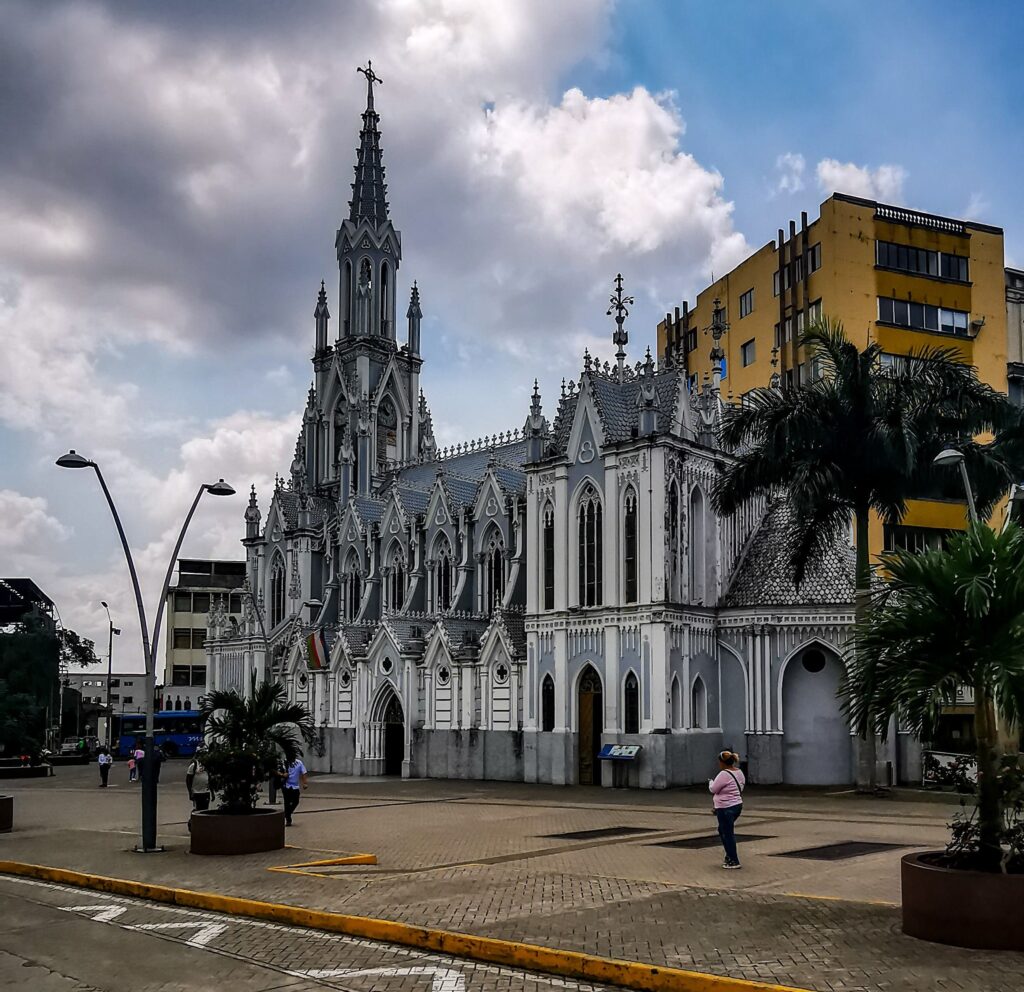
When I arrived in “Cali” I drove directly to the famous landmark of the city. At the “Iglesia Ermita” a local television team was already waiting for me. In order to recite everything flawlessly in Spanish, several takes were necessary. After all, I had two hours of free Spanish lessons. After the interview, the team showed me around the city. Not for nothing is “Cali” considered the capital of salsa. Almost every street corner is about music and dancing. When I arrived at my accommodation, my host invited me to go into town in the evening and dance Salsa. On weekends, the whole city center mutates into a dance floor. All the bars are open and put the loudspeakers on the streets. Drum groups play the salsa rhythms and from young to old the whole town gathers to party. It was a great feeling! The only catch was that I can’t do a bit of salsa, let alone dance. My limitations with my left side and also my poor sense of balance were always a good excuse. But since I enjoy moving to rhythms and wanted to tackle the issue once and for all, I signed up for a two-hour dance class with a salsa master the next day.
The first lesson was still quite bumpy and challenging, but from time to time it worked better and better and at the end I danced a song with my teacher, who was very happy with me. When you watch dancers, it always seems so easy and playful. I completely underestimated it and was exhausted after the time, but proud and satisfied with myself for having taken on this challenge and realizing that it is incredible fun to dance. I would definitely like to do this more often in Germany.
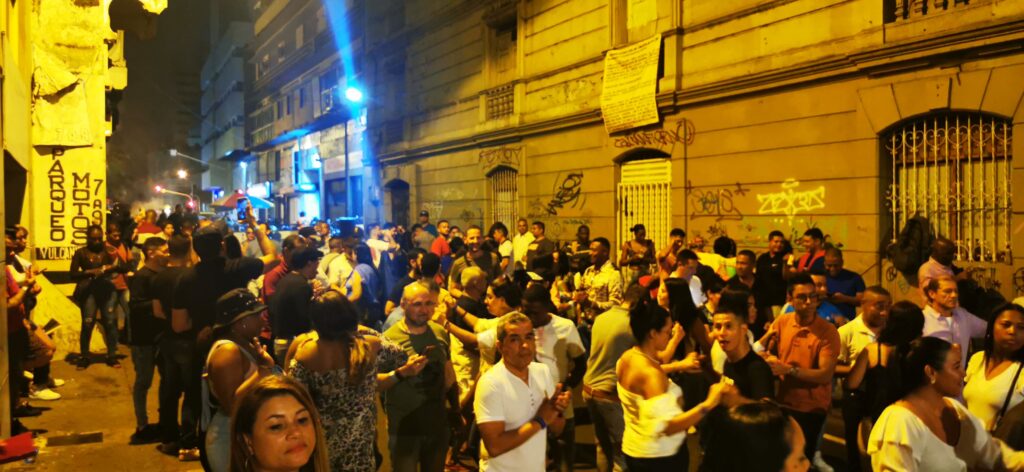
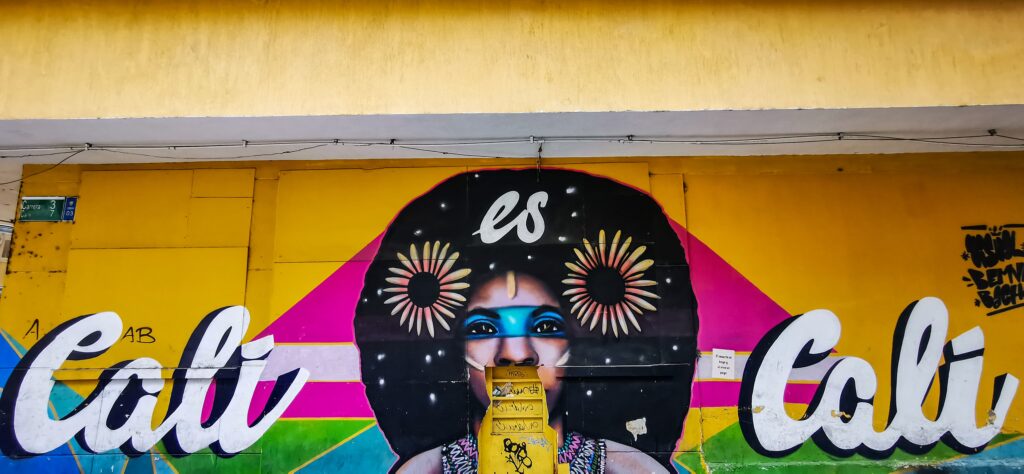
After the weekend in “Cali” my way led me further into the south of the country. Already several months before I came to Colombia, I had regular contact with Andrés Ordonez, who originally comes from “Popayan” a city 200 km south of “Cali” located directly on the Panamericana. Andrés is a very good friend of my sister Kim. She is currently in Australia for a year with her partner. There they met Andrés, who is also traveling. He followed my trip on Instagram and promised me to stay at his home in “Popayan”.
To avoid driving continuously along the busy Panamericana on my way to “Popayan”, I decided to take small back roads near the mountains. Before I came to Colombia, I was told that it was very dangerous in the south around “Cali” and that this was the main cocaine growing and cartel area of the country. Unfortunately I had forgotten this and was happy about the small quiet roads. Only now and then new and expensive pickup trucks drove past me in a monster speed. When I had lunch in a restaurant, the staff approached me and pointed out that the region was not entirely safe. When I asked if there were narcos (Spanish short for dealers or drug traffickers) here, they instructed me to speak softly and watch what I said. The word “Narco” is short for “Narcotraficante”, which means: “drug dealer” or “narcotics dealer”. In this train they always speak of “Narcotráfico” which means “drug trafficker” or “narcotics trafficker”. They told me to turn around and take the big Panamericana, because it would be much safer. A bit unsettled and clearly more alarmed than before, I made my way back. I had to take a 40km detour, but fortunately without any incidents.
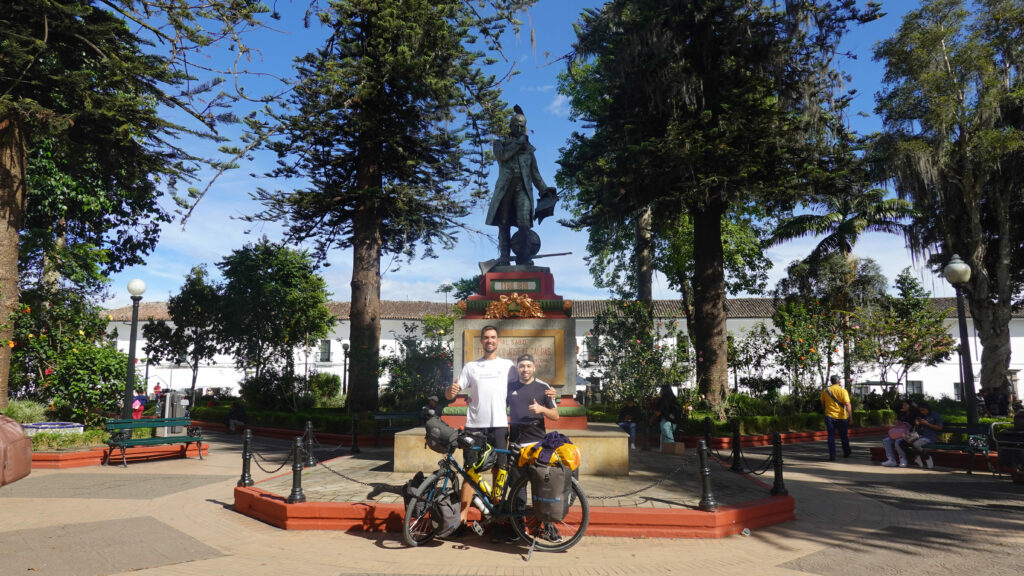
In “Popayan” I was received by Camillo, André’s younger brother and his mother. Mrs. Ordonez, whose two other sons were traveling, was happy about my visit and said that she wanted to take care of me like a mother during the days I was visiting. What can I say, I was festively spoiled. Camillo showed me the city and took me around.
Also in “Popayan” I had a television interview with a local station. The special thing was that the cameraman was so moved by my story that tears came to his eyes. He told me that he had found himself in it, because he had had a bad youth and my story would give him courage to look positively at his future. Even though I have had several such encounters in the course of my journey, it touches and motivates me anew each time.
During the days in “Papayan” I was put out of action for a few days by a stomach infection. Camillo visited some doctors with me and took care of me together with his mother. I was really happy to have such a great accommodation during these days and to be able to recover completely.
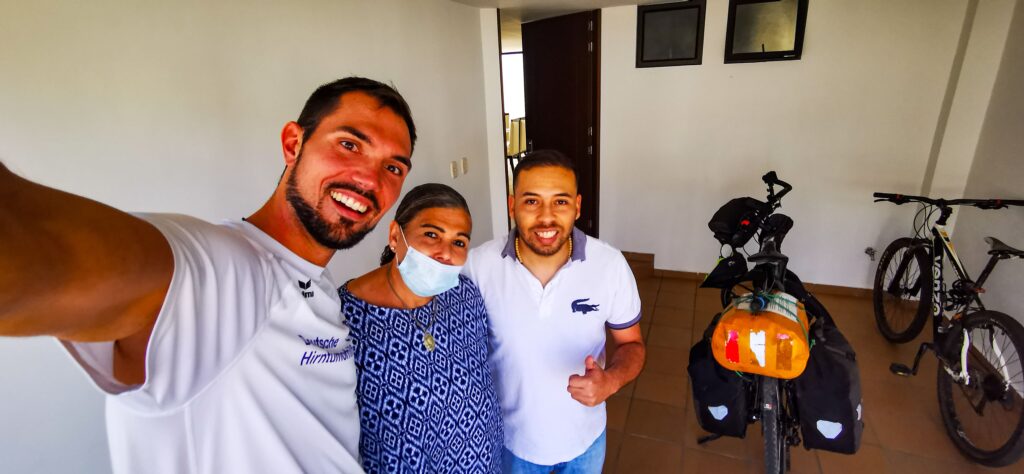
When I was feeling better again, I set off for “Pasto”, the capital of the southern state of “Narino”. Here the nature changed noticeably and it went into the Andes. I had fantastic views and drove through beautiful mountain landscapes. The only downer was that as soon as a mountain was overcome, it changed into a deeply cut valley and then a much higher mountain followed. Every day I overcame between 1500 and 2000 meters of altitude, which at some point was really grueling and extremely energy-sapping. As much as I love the challenge and mountains, it pissed me off at the end after a mastered climb to be immediately “rewarded” with the sight of the next, even higher mountain.
In Pasto, I was invited by Juan Carlos. His story is incredibly sad and at the same time touching, so that I think more and more that all my encounters on the tour definitely do not happen by chance. Juan Carlos works in security and was guarding a large factory three years ago. In the middle of the night, masked men came and threatened the security guards with weapons. Before they could defend themselves, Juan Carlos was hit in the body by 3 bullets. Two more shots fortunately missed his head. However, the two grazing shots left clearly visible scars. After the criminals left, Juan-Carlos was taken to the hospital and underwent emergency surgery. He barely survived, but fell into a coma for over a month. In the end, he was close to dying. Jose told me that during the time he was in a coma, he could hear voices. Shortly before he was resuscitated, he was less and less aware of his body and could look at himself as if through the eyes of a third person, he told me. Suddenly, he would have been in a huge white room and saw a cross framed by glaring sunlight.
He reported that he felt a pressure on his shoulder and should decide to go to the cross. However, he looked back to his body and was sure he could take the place in his body again. After making this decision, he felt beats on his chest and how his heart began to beat again. The next moment he had come to and was lying in the hospital, surrounded by doctors.
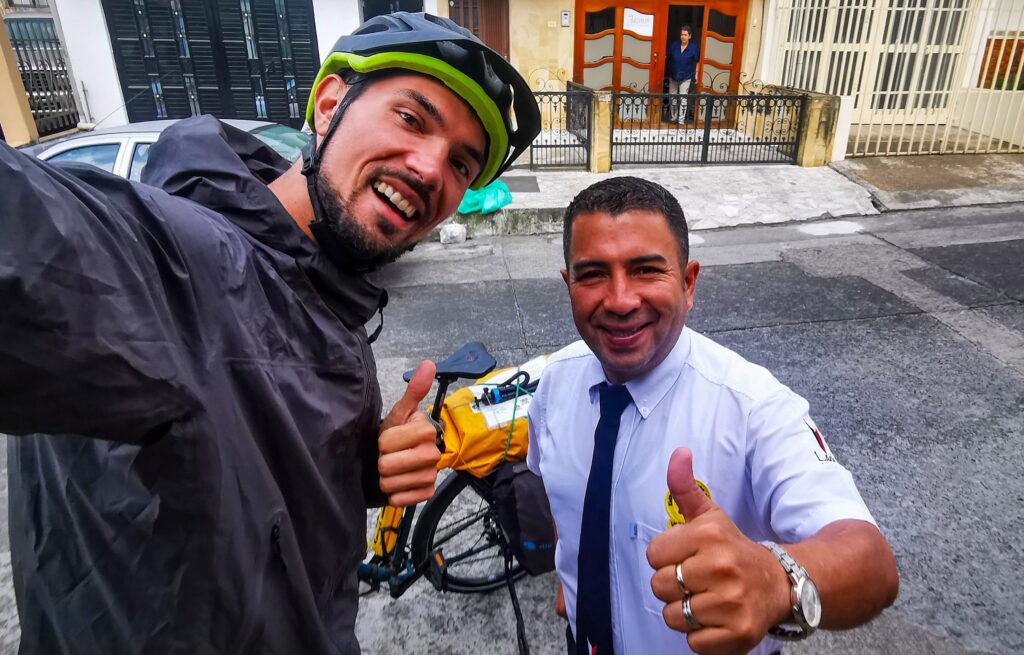
This story sounds so amazing and I would not have believed it if he had not told it to me personally. The emotions he had while telling it give me goose bumps again, even while writing it. At the end, he showed me his tattoo that he wears on his forearm since then, showing the cross with the rays of the sun. Juan Carlos’ life has changed completely since then. He became very devout, is grateful for every moment of his life and spends as much time as possible with his family. This story is so touching for me and proves to me how grateful we can be to have been given the gift of life. Above all, it shows me how important it is to live consciously and not lose sight of what is truly essential.
Shortly before the border of Ecuador, my way led me past the famous Catholic monastery church and pilgrimage site “Santuario de las Lajas”. In a deep gorge lies a majestic looking church that resembles a fairy tale castle. At night it is colorfully illuminated and is a point of attraction for many pilgrims, travelers and tourists. It was a truly fantastic sight.
